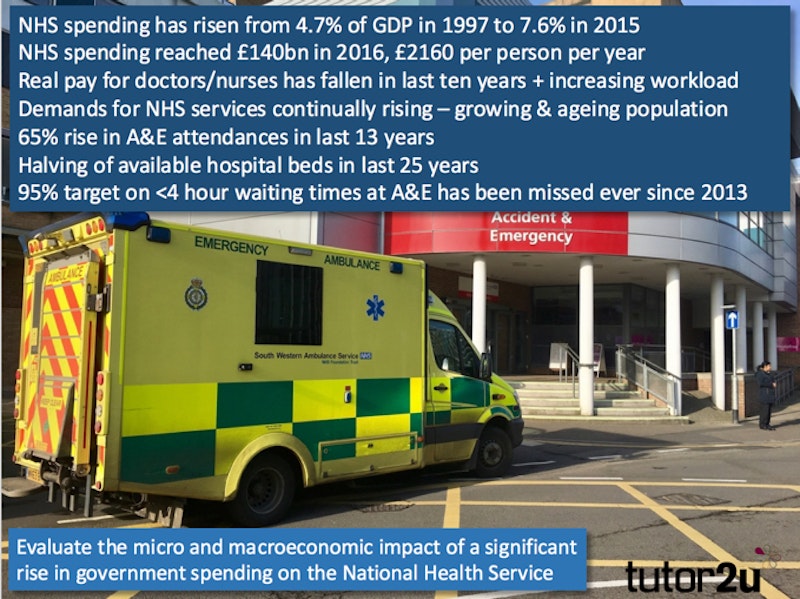Study Notes
Economics of Health Care Funding
- Level:
- AS, A-Level, IB
- Board:
- AQA, Edexcel, OCR, IB, Eduqas, WJEC
Last updated 9 Mar 2018
Health care is a crucially important issue for all economies. In many countries a mix of economic, social and demographic factors are causing an increase in demand for different health care services putting pressure on government budgets especially in countries where the majority of health care is funded directly by the state.

Rising demand for health care
There is strong pressure for rising health care spending in many countries including the UK. Here are some causal factors:
- Ageing Population
- Rising expectations
- Increasing inequality of income and wealth
- Growing population
- High cost of new treatments
- Chronic illnesses & conditions
Who Should Fund and Provide Health Care?
Should health care treatments be provided by the state free at the point of need? Or should markets play a bigger role?
Scale and Scope: Priorities:
- How important is health care to an economy?
- Might other areas of govt spending become more important in the future requiring a shift of resources?
Short run and Long-run:
- In the long run, can a “free” NHS be sustained?
Equity / fairness:
- Many people see ‘free’ access to high quality health care as a right, and a fundamental issue of ‘fairness’ or equity
Alternatives:
- What are the alternative ways of providing health care?
- Strong evaluation draws from different countries
The Case for State (Government) Health Care
- Helps to provide equality of access to key healthcare resources not based on people’s ability to pay
- A state-funded service can provide impartial advice and help helping to avoid some information failures
- By making health care cheap and readily available it could promote consumption thereby raising GDP
- Positive externalities – the merit good aspect to affordable and widely accessible health care.
- A large provider of health care can enjoy economies of scale – therefore more efficient than the private sector
The Case for Market-Provided Health Care
- You don’t have queues or rationing in markets. There might even be less wasteful use of services.
- The best health firms (hospitals) should compete for excellence, innovation, top staff and the best procedures.
- Providers should be anxious to cut costs and increase efficiency.
- If people know that they are responsible for paying for health care, it might influence their lifestyle choices.

Alternative Funding of Health Care in the UK
Strong critical evaluation in micro exams includes assessing the alternatives available i.e. which of these options might be most effective in the long run in easing the financial burden on the NHS?
- Incentives to take out private insurance
- A rise in prescription charges for basic medicines
- Private hotel-style beds to raise extra revenues
- Basic annual NHS subscription system for all
- More health tourism in overseas countries
- Funding preventative programmes
You might also like
Economic Growth - Human Capital
Study Notes
Minimum Alcohol Prices (Government Intervention)
Study Notes

Intervention in Markets - Will the legal highs ban work?
31st May 2016

A Crisis in Learning - The 2018 World Development Report
26th September 2017
World Bank launches new human capital index
14th October 2018
Development Economics - Selection of Revision MCQs
Practice Exam Questions
1.4.1 Minimum Prices (Edexcel A-Level Economics Teaching PowerPoint)
Teaching PowerPoints